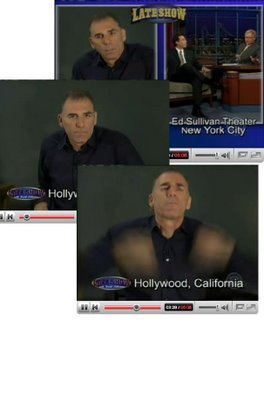Kramer or Michael Richards?
In brief: Michael Richards, aka Kosmo Kramer, from Seinfeld went berserk at a comedy club a few days ago shouting racial slurs and profanities at hecklers who were black. Yesterday Richards appeared on The David Letterman Show with Jerry Seinfeld and fumbled through a clumsy apology.
It was interesting to watch the You Tube replays of the Letterman interview. With Jerry Seinfeld in studio with Letterman Richards appeared via satellite and apologized. He was obviously shaken and broken over the experience. Several times he either loses or changes his train of thought and begins to just mumble and babble. Letterman rescues him several times and tries to make the interview a good showing for Richards.
But the thing that I can't get out of my mind about that Letterman interview is this: the Letterman studio audience was laughing.
All through the beginning of the interview there are chuckles and laughter heard from the live crowd. At one point Seinfeld even says, "Stop laughing. It's not funny." And then just a few moments later Letterman asks a question directed at Richards who just stares blankly at the camera for a few seconds - his thoughts obviously scattered. To this the audience reacts by roaring out with laughter.
Now, at this point, Richards addresses the laughter from the audience and questions whether he should be taking this interview. He resents the laughter and says that he is pouring his heart out.
But why did the audience erupt in laughter?
I was listening to a talk radio show today where they brushed off the laughter incident by saying that the audience was nervous and didn't know how to respond to the tension of the situation. But this explanation doesn't cut it. For one thing, the audience laughs at several intervals through the first few minutes of the interview, and it is clear that this is hearty laughter - not nervous chuckles. Secondly, there is one point in the interview - the point at which the audience bursts out laughing - that Jerry tries to interject and says to Michael Richards, "There used to seeing you as...." He doesn't finish the sentence, but it is clear Jerry means to say that the audience is used to seeing Richards as Kramer.
But this raises the intriguing question about just who it was we were watching last night. I, myself, as repulsed as I am by the racist tirade of Richards and as moved as I was by his brokenness during the Letterman interview - I still can't help but thinking that the whole thing just seemed like another half-hour Seinfeld episode. And this is because to me and to the Letterman studio audience Michael Richards has no identity except for that of the Kosmo Kramer character. Richards will never really be Richards to most of us. "Michael Richards" is just a name that somehow stands for the "real" person. But Kosmo Kramer is the more real character. He is the one who makes us laugh and compels us to analyze and appreciate the various nuances of his life.
If Richards walks down the street, who is he? No one wants to talk to Richards, everyone just wants to talk to Kramer. We want to hear his bizarre theories on life, see his crazy hair, and watch him slide through the door. Nobody really cares about Michael Richards.
The greater issue, then, has to do with defining what is "real" in this age of technology. There is no longer a clear line between the fiction of a television sitcom and the reality of our daily lives. Sitcoms take their cue from reality and reality takes its cue from the Sitcoms. It is a circle that spins around so fast that we can't really ever tell who is influencing who at any particular time.
Life mirrors art, and art imitates life. This may have always been true, but in today's digital age the blurring of the lines becomes more relevant because it is possible to spend the majority of one's life in virtual worlds. We blog for hours. We watch Youtube videos. There are message boards and video cameras, and everything we need to live the majority of our lives in the cyber world. It becomes its own community and defines a large portion of our lives. As we invest more and more time into the cyber world it begins to impart meaning into our lives and we impart meaning into it. Is this cyber community any less real than going to a church softball game on a Thursday night? Or attending a board meeting at the local Habitat for Humanity branch? Is it any less real to blog and discuss sports online than it is to stand around the water cooler?
For Michael Richards these questions are personal, because he created a character bigger and more real than he will ever be. But is the question of "what is real?" any less relevant?
Reuter's Article







3 comments:
Gosh, that video was painful to watch. Hopefully this leaves him more introspective and sends him on a search for answers to that anger.
Absolutely. I couldn't agree more.
Even more disturbing than watching this Letterman video was watching the outburst at the comedy club. He just got completely caught up in his anger and rage...so much so that when he did Letterman he was still reeling and looking for answers.
I get the impression that Michael Richards is completely different from Kosmo Kramer. Kramer is carefree, fun loving, and even a little reckless. Richards seems to be a very introspective and driven man - a compulsive perfectionist spending hours on his craft....
美女寫真xxx383美女寫真85cc免費a片試看日本美女寫真集寫真集蔡依林寫真集寫真女郎影片0401成人交友-情色免費看a片脫星寫真圖片美女寫真影片免費觀賞sex888免費看影片色美媚部落格情色080視訊聊天室情色貼圖情色a片視訊情人交友聊天室小魔女貼影片a片天使洪爺情色論壇成人小說情色文學sex383線上娛樂場情色小說情色視訊情色交友情色論壇ut聊天室情色網台灣a片王免費視訊a咆哮小老鼠麗的情色小遊戲
Post a Comment